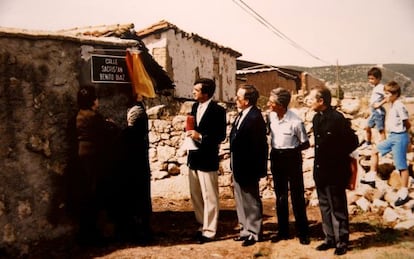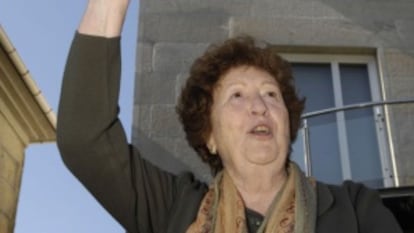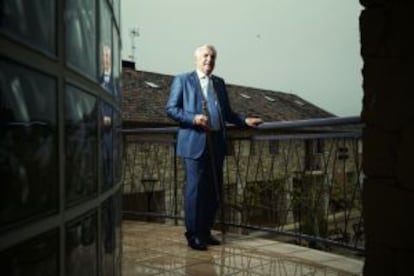Town mayor since 1979
Around 50 local leaders have been in office since the first elections after Franco’s death


In 1979, less than four years after the end of Spain’s Franco dictatorship, a then-23-year-old Carlos Rivera decided to run for mayor in Torremocha del Jarama, around 50 kilometers north of Madrid, in what was then a remote and deprived community. Thirty-six years later, he’s still in office after winning nine consecutive elections, and proud of his record: “This was a community of 140 people, everybody was leaving, but now there are 1,000 inhabitants, with a nursery, a school, a retirement home... In those days there was nothing, now people are born here and spend their lives in the village, living and working.”
Our mayor is like Beethoven: he’s composed nine legislatures and he’s deaf to the opposition” A United Left councilor in Villanueva de la Cañada
Of the 8,122 mayors in Spain, 47 have been in office since they were elected in the first municipal polls after the return to democracy, held in 1979 (the last having taken place in 1931). Some of them, such as Senén Pousa Soto of the Popular Party, mayor of Beade, in the northwestern province of Ourense, were appointed under Franco. Most of them, like Rivera, are to be found in small rural communities of fewer than 5,000 people, and almost all enjoy an absolute majority.
“The key to their success lies in one of two extremes,” says political analyst Fernando Vallespín. “Some will be mafioso types, skilled in the art of patronage, and others will be people who have transformed their communities, making decisions that have improved the lives of their electorate. And in both cases they will have strong personal appeal.”
In many cases, this personal appeal is stronger than party politics. Luis Partida, mayor of Villanueva de la Cañada, a wealthy community in Madrid’s northwest, belongs to the PP. But accompanying him on a stroll through the village, it’s clear he enjoys widespread support: “We vote for Luis, not for the PP,” says a long-standing friend whose family otherwise votes left. “If it ain’t broke, why fix it?” says another resident. “My promise has been the same since 1979: to provide solutions to people’s everyday problems,” says Partida. “The secret of success is to listen to people.”
A publicity-shy politician

For the last 40 years, without interruption, Pilar Otilia López has served as mayor of Ramirás, a remote rural community of around 1,600 inhabitants in the hills of Ourense province in Galicia. She was appointed in 1975, when Spain was still under the military dictatorship of General Francisco Franco, by the local civil governor, going on to win re-election four years later on behalf of the grouping that would become the Popular Party.
She is the third generation of her family to run things in Ramirás, following in the footsteps of her father and uncle; and everybody in the village seems to accept that her nephew, César López, who sits on the local council, will take over from her when she stands down after running for what will be her tenth successive election.
López is the only female mayor to remain in office after four decades, watching opposition councilors from the Socialist Party and the Galician National Bloc (BNG) come and go over the years.
Described by locals as having a “forceful personality,” López turned down an interview with EL PAÍS. Her political opponents attribute her political survival to her “feudal approach,” accusing her of patronage, for example by ceding the franchise for running the village’s retirement home to a company owned by another wealthy local family. “She hires and fires people, and so they vote for her, hoping to keep their jobs, or to get them back,” says a local Socialist Party politician.
The Socialist Party and the BNG have four members on the local council, while López has the support of six PP councilors. Faced with the impossibility of reaching any kind of agreement, the opposition has decided to take legal action, but so far, the lady has shown she’s not for turning.
But not everybody in Villanueva de la Cañada agrees: “When a mayor has been in office that long, he ends up thinking he’s some kind of king and doesn’t take criticism easily,” says Miguel Ángel Hernández of the Citizen’s Initiative for a Sustainable Villanueva de la Cañada. He is opposed to the mayor’s approach to development, which over the last two decades has seen the community grow from around 1,000 inhabitants to 20,000, based on property development. “This isn’t sustainable,” he says standing amid unfinished houses and empty properties abandoned when the crisis hit in 2008. “But it has earned him votes. People with land have made huge amounts of money from rezoning and property development, while others found employment from the work it generated.” A property scandal a few years ago pointed to the local council’s involvement, but was never pursued in the courts.
“When I took office there were no schools here, now we have eight. Life is very good here, and we have no debt,” counters Partida to criticism of his policies.
But in Torremocha, where environmental protection groups have tried to prevent a number of property developments going ahead, the local council has run up arrears of €1.3 million. It owns a supermarket, a music school, a bar, a small agribusiness estate, and has built low-rent apartments. Carlos Rivera’s policies have been to provide services for local people, and to build homes to attract new arrivals. “Yes, we have run up debt, but I prefer to owe money and have 80 children at school rather than stand idly by,” he says.
Rivera, who has the support of six of the local council’s seven members, will face well-organized opposition in the municipal elections on May 24. “Our goal is to go from 6-1 to 4-3 and bring a halt to these excessive policies,” says Patricia Villa, a new arrival who is standing along with two other independents. “The mayor has done a huge amount for the village and is extremely friendly, but there is a lack of transparency, and when somebody has been in office for so long, things get done their way, and it is difficult for everybody else to participate in the decision making,” she says.
In Villanueva de la Cañada, Manuel Gonzalo, the only representative of the United Left on the local council, says Mayor Partida is like Beethoven: “He’s composed nine legislatures and he’s deaf to the opposition. When we first joined the council, the meetings would last five minutes, but by insisting, we have finally been given the right to reply.” At the same time, Gonzalo admits that the mayor is genuinely liked by the community: “It’s clear that the property boom benefited a lot of people who repaid their gratitude by voting for Partida, but it’s also true that he knows how to get things done and he is well liked.”
My promise has been the same since 1979: to provide solutions to problems. The secret of success is to listen” Luis Partida, mayor of Villanueva de la Cañada
Partida, aged 68, says he had planned to stand down, but that his family persuaded him to run for a 10th term. “These are difficult times for the party and we have to show that we’re not all the same,” he says referring to the corruption scandals that have hit the PP over recent years.
Perhaps surprisingly, Partida says he supports proposals to limit mayoral terms to three. “When you know you only have a limited time in office, you work harder to get things done,” he says.
At the age of 63, the Socialist Party’s Martín Llanas has just stood down as mayor of Épila, in the northeastern province of Zaragoza after nine consecutive terms in office. “I’m not tired, but the time has come. I am trying to get my head round what my new life will be like,” he says, adding that he intends to remain a local councilor.
Carlos Rivera says the main risk of remaining in office over the decades is “losing your sense of hope, and perhaps falling into a routine.”

But Llanas says that imposing a three-term limit will do little in itself to counter corruption or abuse of power: “There are characters who will rob in eight years, and there are those like me who haven’t robbed in 36 years.”
All three say they had “no idea” what they were doing when they entered local politics. “Those of us who emerged out of those elections were all the same,” says Partida, who nevertheless criticizes the lack of experience of those challenging him for office now. “They had the opportunity to learn about how things work gradually; we never had that chance,” he says.
The elections in Torremocha will coincide this year with the annual festivities to celebrate San Isidro, the patron saint of Madrid. They are expected to be tense, with the opposition using the fiesta to campaign against Rivera. He says he is ready for a fight, and that he expects to win these and the next elections, and intends to retire in 2023 aged 67, after 44 years in office. “You must never think it’s going to be a walkover, however many years you’ve been in office, you still have to fight for every vote.”







































